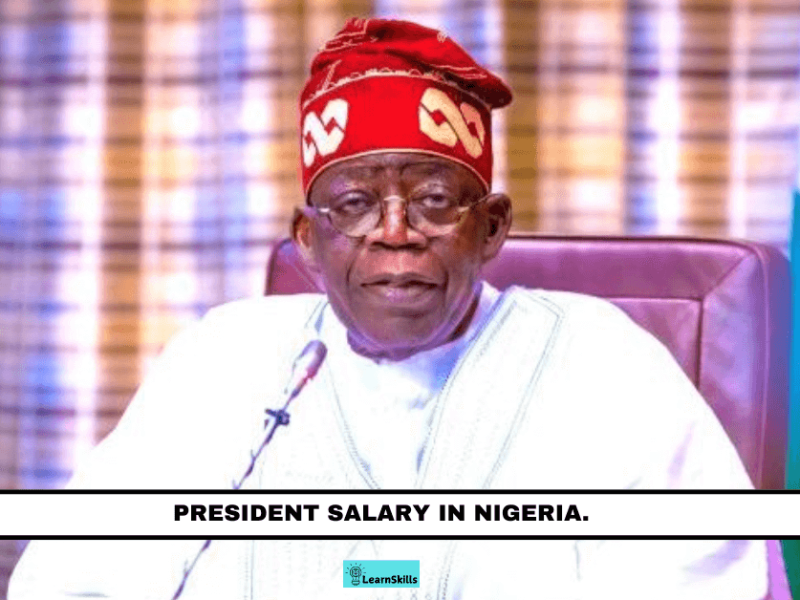In Nigeria, the salary of the President often sparks discussion among citizens. As of 2025, the President’s annual salary is approximately ₦14,058,820, translating to around ₦1,171,568 per month.
This figure can seem surprising, especially compared to the earnings of other public office holders in the country, such as ministers and governors, who earn significantly less.
Since Nigeria transitioned to democracy, the discussion about salaries for public officials has gained more attention. Many people question whether these salaries reflect the challenges faced by everyday citizens.
Understanding the President’s salary and how it fits into the broader picture of governance in Nigeria can provide insight into the relationship between public officeholders and the citizens they serve.
Presidential Compensation Structure
Presidential compensation in Nigeria includes a basic salary, various allowances, and additional financial benefits. Understanding this structure helps you see how the salary correlates with other economic factors like inflation and the minimum wage.
Basic Salary and Allowances
The President of Nigeria receives a basic monthly salary of about ₦1,171,568, translating to approximately ₦14,058,820 annually.
In addition to the basic salary, the President gets several allowances including housing, transportation, and security allowances.
For instance, the housing allowance is often substantial, helping to cover the costs related to the official residence. Together, these amounts form a significant package that reflects the importance of the presidential role.
Other Financial Benefits
Beyond salary and allowances, the President has access to various financial benefits. These may include bonuses and other perks tied to performance and responsibilities. Additionally, the President can receive funds for official trips and events.
This financial framework is essential for fulfilling the duties expected from a head of state. Many of these benefits remain confidential, adding layers to the compensation structure.
Comparative Salary Analysis
The difference between the President’s salary to Nigeria’s minimum wage is striking. Currently, the minimum wage is around ₦70,000 monthly, which is far lower than the president’s salary.
This disparity highlights the economic divide in Nigeria. It also raises questions about income distribution and inflation impact.
Many argue that presidential salaries should reflect the economic realities faced by ordinary citizens. The high compensation might be necessary to attract qualified candidates, yet it remains a topic of debate among the public.
Legal Framework and Regulatory Bodies
The President of Nigeria’s salary is shaped by a structured legal framework. Key entities play vital roles in determining and regulating these remuneration policies. Understanding these roles will give you insight into how salaries are set for political officeholders.
Role of the Revenue Mobilization Allocation and Fiscal Commission
The Revenue Mobilization Allocation and Fiscal Commission (RMAFC) is crucial in Nigeria’s political salary structure. This commission develops policies for the remuneration of political office holders, including the President.
RMAFC is responsible for the guidelines that dictate how salaries and allowances are structured, like the 2000 Remuneration Report, set standards that guide current pay scales. The commission also reviews and recommends salary adjustments based on economic factors.
Comparisons and Public Perspectives
The salaries of Nigerian leaders, including the President, Vice President, and governors, often spark discussion. This section explores how these salaries compare with other public officials and how they are viewed by the public and in the media.
Comparison with Other Public Officials
The President of Nigeria earns a monthly salary of about N1.2 million. In comparison, state governors typically make around N648,581 monthly.
Vice Presidents and Senators also receive significant salaries, but they often get bonuses and allowances that can boost their overall earnings.
State Governors generally earn more than ministers, who take home less than N1 million monthly. Special assistants usually earn less than top officials but still receive respectable salaries.
Understanding these salary structures helps clarify the earnings of public officials and highlights differences among various positions.
Public Opinion and Media Reports
Public opinion on the salaries of Nigerian leaders varies widely. Many citizens argue that the high salaries of politicians are unjustified, especially given the country’s economic challenges.
Media reports also highlight the sacrifices leaders claim to make for the nation, yet critics question how much these sacrifices equate to the financial benefits received.
Politicians, including the President and Vice President, are frequently scrutinized over their compensation, creating a dialogue around fairness and accountability.
International Benchmarks
When compared to International standards, Nigerian salaries often appear modest. For example, the monthly salary of many leaders in developed countries can be several times higher. Still, these leaders might face different responsibilities and expectations.
Globally, public officials are expected to reflect the economic situation of their countries. Many believe that salary adjustments should consider the local economic context in Nigeria.
Discussions around government salaries continue to evolve, influencing how public officials are perceived locally and internationally.
Challenges and Controversies
The salary structure of Nigeria’s president has sparked significant debate and controversy. Issues surrounding jumbo pay and the assignment allowances of lawmakers are important factors.
Additionally, public protests have arisen against perceived salary level disparities, creating a platform for discussions on fairness and accountability.
Jumbo Pay and Oversight Assignment Allowances
Jumbo pay refers to the high salaries and allowances received by Nigerian lawmakers, including the president. For example, the President of the Senate reportedly earns an annual basic salary of ₦8,694,849. This amount does not include additional allowances, which can significantly increase total compensation.
Many citizens question the fairness of these salaries, especially when compared to average incomes. Given Nigeria’s economic challenges, critics argue that such high pay is unjustified.
The lack of transparent oversight regarding these salaries adds to public frustration. This has led to calls for reforms in how salaries are structured and reported.
Protests Against Salary Structures
Public protests against the salary structures of government officials have gained momentum in Nigeria. Many citizens feel that their tax money should not support high salaries for politicians when basic needs remain unmet.
Demonstrators highlight the contrasts between government paychecks and the struggles faced by ordinary Nigerians.
Activists emphasize the need for salaries that reflect the country’s economic realities. Political parties have been pressured to address these discrepancies, yet many remain silent.
Anticipated Changes in Compensation
In recent years, there has been increasing pressure to reform the salaries of public officials in Nigeria. The annual take-home pay for the President and other leaders has come under scrutiny.
Currently, the monthly salary for the President is noteworthy, but many believe it does not reflect the economic challenges citizens face.
Proposals to adjust these salaries could include linking them to performance or implementing a salary cap. This might ensure leaders are accountable and fair in their compensation, especially during difficult economic times for everyday Nigerians.
Discussions on Political Salary Reforms
The topic of political salary reforms is gaining traction in Nigeria. Many are advocating for a review of public office holders’ compensations. This includes other significant roles like the Senate President and not only the President.
With the rising cost of living, people are calling for a change. Recent reports show that reforms could lead to a more equitable system. For example, adjustments may address the disparity between the salary of leaders and the average worker’s income in Nigeria.
Such changes could aim to enhance trust between the government and the public. They would ensure leaders earn a fair wage relative to their responsibilities and the needs of the citizens.










